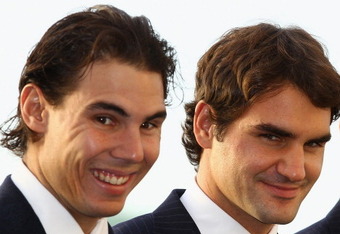 |
| Scott Barbour/Getty Images |
Rafael Nadal and Roger Federer: They Seem Friendly But Their Fans Are Not
ByVijaylakshmi Shetty (Correspondent) on December 1, 2010
The Nadal-Federer rivalry is the most talked about rivalry in tennis history with the head to head statistic being a popular topic of discussion. An unusual feature of this rivalry is that while the champions seem friendly with each other, their fans are at daggers drawn.
Some of the Federer fans seem to hate Nadal, some accuse him of cheating and state it as a certainty that his career will be brought to an end soon because of his knees. Some even go to the extent of speculating on the possibility of his dying in an accident!
Most of the Nadal fans do not hate Federer but prefer their idol. The only criticism they level against Federer is his admiration for himself and his seeming lack of grace sometimes in acknowledging his rivals' strengths.
When Roger Federer was dominating the tennis world, he seemed to dominate his opponents effortlessly and completely. He steamrollered the other players and crushed them so completely that when he praised Fish because he took a set off him at Wimbledon 2003, it was seen as a compliment not just by Federer but also by his millions of adoring fans. Who knows, even Fish might have seen it as a compliment.
With Nadal however, the domination is of a different kind. With him, we have to go through emotional rollercoasters while he endeavors to get the better of his opponents in his epic battles.
The two champions also have a different approach to their victories. Federer, possibly because he could crush his opponents, is absorbed in his victory and has little or no sympathy for the vanquished. He is loathe to share credit for his victories with anyone, not even his coaches, as seen in his almost casual reference to Annacone after his WTF victory. When he wins, he says it is because he is hugely talented. When he loses, it is because he did not play well.
Nadal, on the other hand, having fought every point, knows he could well have been on the losing side and so feels the pain of the player he finally brought to his knees.
So, with their contrasting styles of play and approach to victory and defeat, it is not surprising that they have attracted different types of fans.
The Federer style attracts two types of fans: those who admire totalitarianism (a style which brooks no opposition) and those who admire effortless grace and beauty in tennis.
The first type hates Nadal because he punctured their idol's invincibility. Had he been as ruthless as Federer in his elimination of his opponents, they might have switched loyalties to him but they cannot admire him because he is too human. He struggles. His victories are not effortless. He is so obviously not a God.
In short, this type of Federer fan is the sort that is attracted to an all-powerful God who can crush his challengers like an elephant crushes ants. As Federer is a God to this fan, any criticism of him is seen as blasphemy and there is no mercy shown to dissenters.
Usually, instead of countering "unwelcome" opinions or facts, the "totalitarian" fan prefers to attack the person who stated the opinion or presented the facts. The "offending" person is vilified as a hater and accused of being "sick in mind."
Even reminders of Federer's age and predictions of impact this could have on his performance are dismissed as "garbage" and this type of fan fully expects Federer to continue to dominate the tennis world forever.
However, the other type of Federer fan is attracted by the beauty of Federer's style and appreciation of his genius rather than by his dominance or ruthless crushing of the opponents. These fans constitute the tolerant part of his fan base—while they prefer Federer, they do not hate Nadal. They also see their idol as a human. They accept some criticism of him and are generally prepared to listen to reason instead of joining the "totalitarian" mob in its blood lust for the "dissenters." While this reasonable type may constitute the majority or at least half of the fan base, it is not as vocal as the totalitarian group.
The Nadal style attracts those who are admirers of the human spirit: the constant endeavor to overcome obstacles and to accept new challenges.
The Nadal fans do not hate Federer. Many of them, in fact, are admirers of Federer for his undoubted genius and fluid grace, but they have given their hearts to Nadal.
Nadal fans are attracted by their hero's display of his emotions as he battles, his struggles against his injuries, his modesty, his empathetic compassion for those he defeats and above all by his champion's heart.
They are more tolerant of dissent and endeavor to convince rather than bulldoze others into acceptance of their views.
If there had been only the "beauty and genius" fans of Federer to contend with, the fans of the two rivals would probably have got along as well as the champions themselves. But the "totalitarian" fan, with his penchant for steamrollering all opposition has introduced vitriol into what should have been friendly debates.
Some of the Federer fans seem to hate Nadal, some accuse him of cheating and state it as a certainty that his career will be brought to an end soon because of his knees. Some even go to the extent of speculating on the possibility of his dying in an accident!
Most of the Nadal fans do not hate Federer but prefer their idol. The only criticism they level against Federer is his admiration for himself and his seeming lack of grace sometimes in acknowledging his rivals' strengths.
When Roger Federer was dominating the tennis world, he seemed to dominate his opponents effortlessly and completely. He steamrollered the other players and crushed them so completely that when he praised Fish because he took a set off him at Wimbledon 2003, it was seen as a compliment not just by Federer but also by his millions of adoring fans. Who knows, even Fish might have seen it as a compliment.
With Nadal however, the domination is of a different kind. With him, we have to go through emotional rollercoasters while he endeavors to get the better of his opponents in his epic battles.
The two champions also have a different approach to their victories. Federer, possibly because he could crush his opponents, is absorbed in his victory and has little or no sympathy for the vanquished. He is loathe to share credit for his victories with anyone, not even his coaches, as seen in his almost casual reference to Annacone after his WTF victory. When he wins, he says it is because he is hugely talented. When he loses, it is because he did not play well.
Nadal, on the other hand, having fought every point, knows he could well have been on the losing side and so feels the pain of the player he finally brought to his knees.
So, with their contrasting styles of play and approach to victory and defeat, it is not surprising that they have attracted different types of fans.
The Federer style attracts two types of fans: those who admire totalitarianism (a style which brooks no opposition) and those who admire effortless grace and beauty in tennis.
The first type hates Nadal because he punctured their idol's invincibility. Had he been as ruthless as Federer in his elimination of his opponents, they might have switched loyalties to him but they cannot admire him because he is too human. He struggles. His victories are not effortless. He is so obviously not a God.
In short, this type of Federer fan is the sort that is attracted to an all-powerful God who can crush his challengers like an elephant crushes ants. As Federer is a God to this fan, any criticism of him is seen as blasphemy and there is no mercy shown to dissenters.
Usually, instead of countering "unwelcome" opinions or facts, the "totalitarian" fan prefers to attack the person who stated the opinion or presented the facts. The "offending" person is vilified as a hater and accused of being "sick in mind."
Even reminders of Federer's age and predictions of impact this could have on his performance are dismissed as "garbage" and this type of fan fully expects Federer to continue to dominate the tennis world forever.
However, the other type of Federer fan is attracted by the beauty of Federer's style and appreciation of his genius rather than by his dominance or ruthless crushing of the opponents. These fans constitute the tolerant part of his fan base—while they prefer Federer, they do not hate Nadal. They also see their idol as a human. They accept some criticism of him and are generally prepared to listen to reason instead of joining the "totalitarian" mob in its blood lust for the "dissenters." While this reasonable type may constitute the majority or at least half of the fan base, it is not as vocal as the totalitarian group.
The Nadal style attracts those who are admirers of the human spirit: the constant endeavor to overcome obstacles and to accept new challenges.
The Nadal fans do not hate Federer. Many of them, in fact, are admirers of Federer for his undoubted genius and fluid grace, but they have given their hearts to Nadal.
Nadal fans are attracted by their hero's display of his emotions as he battles, his struggles against his injuries, his modesty, his empathetic compassion for those he defeats and above all by his champion's heart.
They are more tolerant of dissent and endeavor to convince rather than bulldoze others into acceptance of their views.
If there had been only the "beauty and genius" fans of Federer to contend with, the fans of the two rivals would probably have got along as well as the champions themselves. But the "totalitarian" fan, with his penchant for steamrollering all opposition has introduced vitriol into what should have been friendly debates.







0 comments